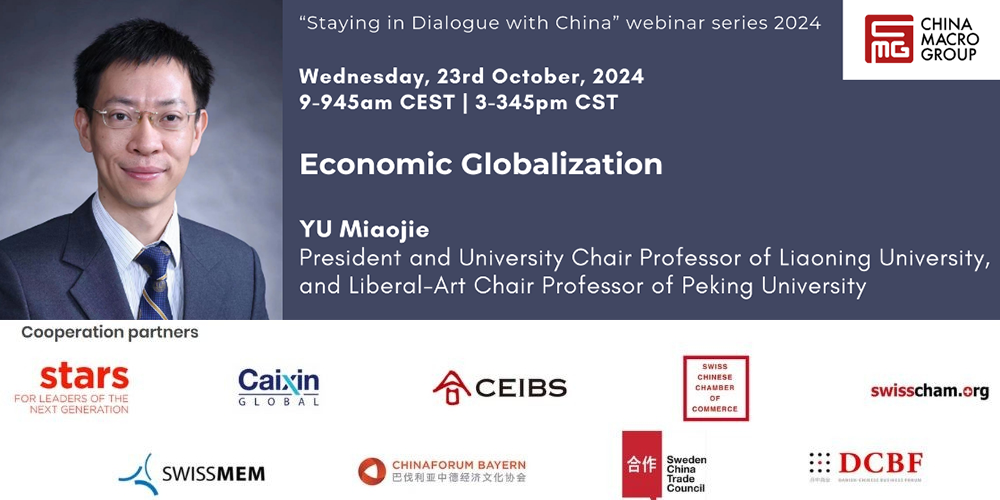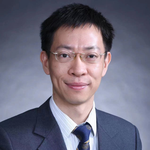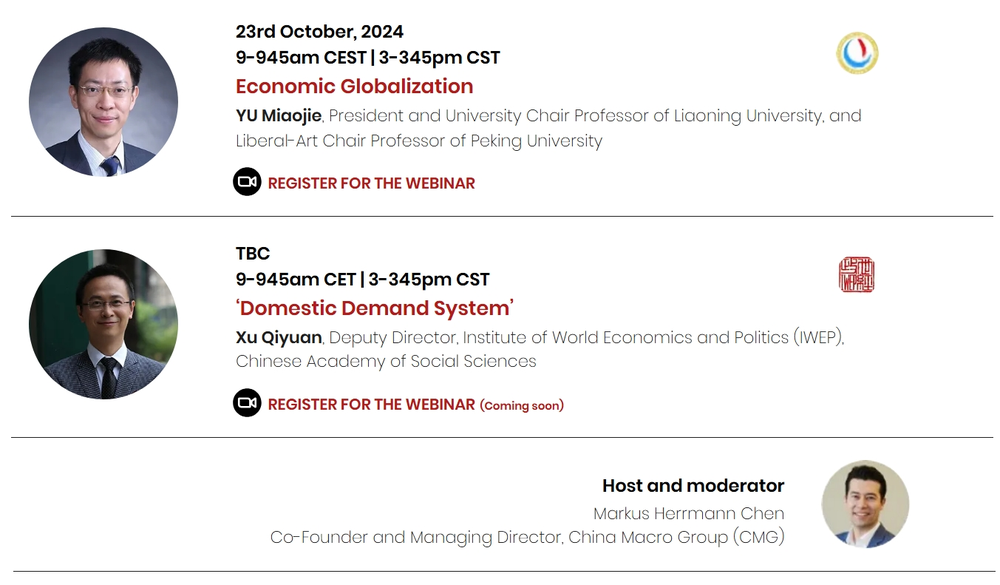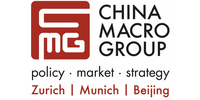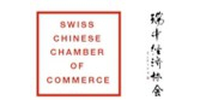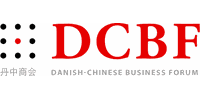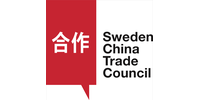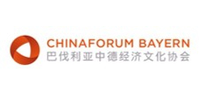Registration
Please click HERE to register.
Please contact melissa.liu@swisscham.org, if you encounter problems with registration or have questions.
Event Details
Dear Members and Friends of SwissCham,
SwissCham Beijing is delighted to invite you to our supported "Staying in Dialogue with China" webinar series - Economic Globalization, which will take place on October 23 at 3pm.
In our fifth webinar of this year's "Staying in Dialogue with China" series, we look forward to talking to Prof. YU Miaojie, President and University Chair Professor of Liaoning University, and Liberal-Art Chair Professor of Peking University, about China's "economic globalization" as a fifth structural transition as per CMG's conceptual framework of China's political economy (cf. CMG).
China in the 1980s embarked on a gradual and selective path of opening up its by then closed economy to the world – understanding that foreign investment and technologies were critical to the country's catch-up development. In the years that followed, most notably after China acceded the WTO in 2001, the Chinese economy rapidly integrated with the world across trade and investment and started its climb in global value chains. At the same time, foreign investment flocked to China to make use of a skilled and comparatively cheap workforce, and in later days increasingly of a highly competitive and dynamic manufacturing and innovation ecosystem. A classic win-win situation.
Around 2015 (publication of "Made in China 2025"), and especially 2016 with the election of US-president Trump, however, the US and increasingly also the EU and other countries started pushing back against China's export-oriented development model that had run large annual trade surpluses and become a significant economic player and competitor internationally in a number of industries. China, in turn, with the 14th Five-Year Plan (2021-2025) unveiled its 'dual circulation' strategy to respond to a more complex global environment – among others in an attempt to make its own economy less dependent on external inputs and strengthen its overall resilience.
To date, the global economic integration has brought great benefits to China, but amid an altered geoeconmic and geopolitical context, how will top-level policymaking evolve? What does Beijing mean with "high-level opening up"? What are policy and market trends for the continued "going out" of Chinese companies? What will Beijing do about the issue of "overcapacity" invoked by many Western governments, as well as its structurally large trade imbalance? In view of some new trade policy measures of the Third Plenum, will we see a stronger trade diversion targeting the Global South? What importance do policymakers still assign to FDI and is it in China's interest to provide a better level playing field domestically? How is China's financial integration with the world going to evolve? What role shall and can the RMB play in all this?
This webinar will be moderated by Markus Herrmann Chen, Co-Founder and Managing Director of CMG. Take the opportunity to listen in and ask your questions to Prof. YU.
This webinar will not be recorded, but a transcript will be published following the webinar.
*******
中国瑞士商会诚挚邀请您参加我们支持的"与中国保持对话"系列网络研讨会之经济全球化,该活动将于10月23日下午3点举行。
在今年"与中国保持对话"系列的第五次网络研讨会中,与辽宁大学校长、校级教授、北京大学博雅讲席教授余淼杰教授一起,探讨中国的"经济全球化"如何成为中国政治经济的第五次结构性转型(根据CMG的概念框架)。
上世纪80年代,中国逐步选择性地开放了当时封闭的经济,意识到外资和技术对国家发展至关重要。在随后的几年中,尤其是2001年中国加入世贸组织后,中国经济在贸易和投资方面迅速与世界接轨,开始攀升全球价值链。同时,外资也涌入中国,利用中国技术熟练且相对廉价的劳动力,后来更是看中中国极具竞争力和活力的制造业和创新生态系统。典型的双赢局面由此形成。
然而,2015年左右("中国制造2025"发布)以及2016年美国总统特朗普当选后,美国和越来越多的欧盟及其他国家开始抵制中国的出口导向发展模式。作为回应,中国在"十四五"规划(2021-2025)中提出了"双循环"战略,试图应对更复杂的全球环境,减少对外部输入的依赖,并增强经济韧性。
迄今为止,全球经济一体化为中国带来了巨大的好处。但在不断变化的地缘经济和地缘政治背景下,顶层决策将如何演变?北京所谓的"高水平开放"意味着什么?中国企业"走出去"的政策和市场趋势如何?北京将如何应对西方政府提出的"产能过剩"问题以及长期存在的贸易失衡?在第三次全会出台一些新的贸易政策措施后,是否会有更多贸易转向全球南方?政策制定者对外资的重视程度如何,中国是否有兴趣在国内提供一个更好的公平竞争环境?中国与世界的金融一体化将如何演变?人民币在这一过程中将扮演什么角色?
本次网络研讨会将由China Macro Group联合创始人兼董事总经理Markus Herrmann Chen主持。欢迎您参加,与于教授互动并提问。
本次网络研讨会不会录制,但会在会后发布文字记录。。
With best regards,
Your SwissCham Team
Online Zoom
Webinar Series
After 45 years of exceptional development and growth, structural complexities in China's political economy are becoming increasingly challenging, calling for policymakers to skillfully navigate China's economy towards the proclaimed 'High-Quality-Development'. To make sense of these complexities and potential policy conundrums that shape the strategic context for foreign business, CMG looks at China's political economy and evolving policy environment by way of six structural transitions – three longer-term transitions that China embarked on with the 'reform and opening up' (改革开放) period, and three more recent transitions involving policy-steered trade-offs and rebalancing.
In this 2024 "Staying in Dialogue with China" webinar series, CMG will explore, debate and refine this conceptualization to these six structural transitions featuring six distinguished Chinese economists as expert speakers. Click here to find out more about the entire series.
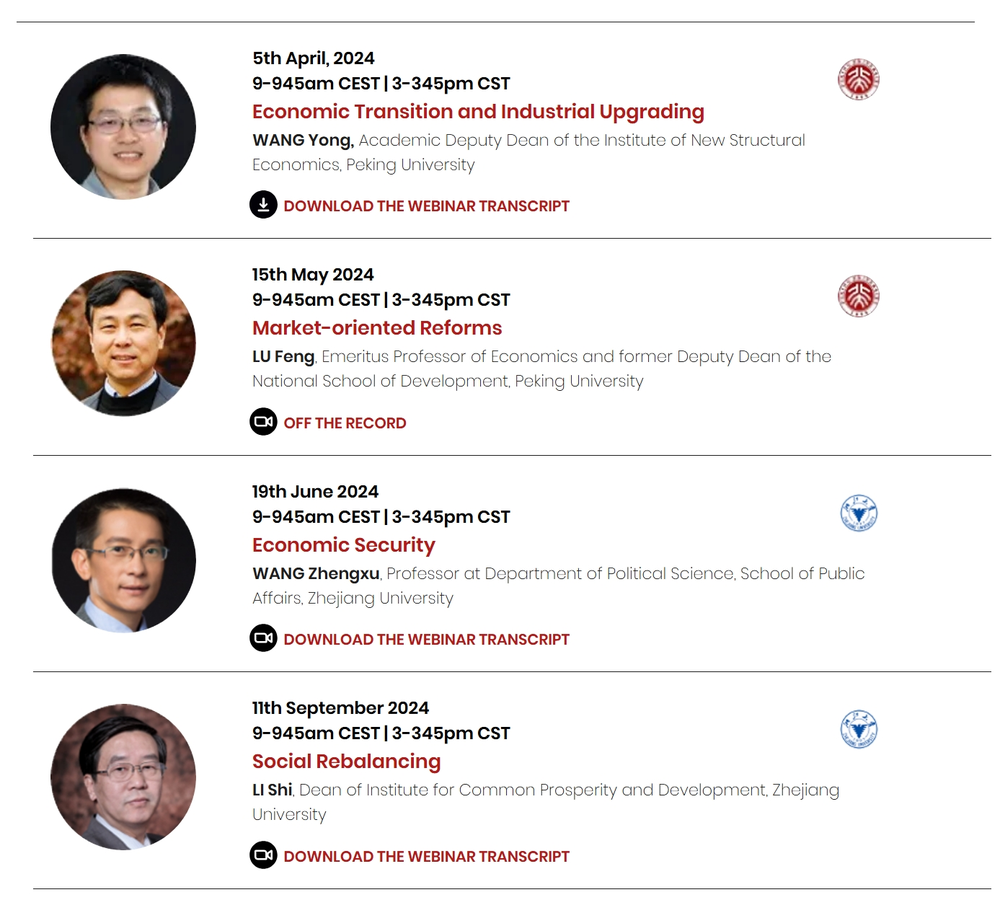
Tickets
- Ticket
- Complimentary
